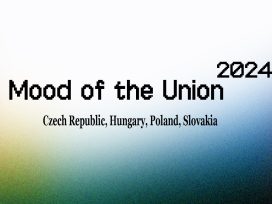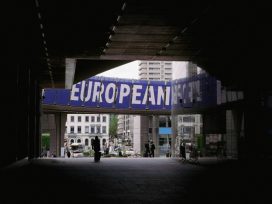You can have no idea, my heir to the true faith, what this prosperous city was like when I was a boy, so listen, for I am now going to tell you.
The bazaar here was called the piac, and at this piac, the pagan women not only sat around without an izar or some other veil to cover their faces, they were not even loathe to shout and quarrel, what’s more, they even laughed with their mouths open. To be sure, many serving women with covered faces came to this bazaar, but the ladies of Ottoman houses would do so only occasionally, and even then, only in the accompaniment of menservants. But there were plenty of German burgher women in kerchiefs, Hungarian farmers, wives of the Serb and Bulgarian soldiers, and all sorts of womenfolk whose identity at first glance I couldn’t have even guessed – Muslim and pagan, gipsy, all without izars, from the outer district of Siklós, Italians from Mill’s Corner, Jewish and Armenian merchants’ wives from Grand Street.
Because, good effendi, in this Hungary here, even before our conquest, the Hungarians lived in the villages, large and small, like peasants, while in the few towns that there were, all the people spoke a different language, because their ancestors had settled here to engage in commerce and industry. The Beys and notables of the Hungarians didn’t live in the cities but in their own castles along with their servants, and didn’t give heed to commerce or industry, because they thought it beneath their dignity. They just liked collecting the taxes and tariffs from the cities, but the great cities their king took from between their hands. Pécs was an exception, because its landlord lived in town, being no other than the bishop himself. Until he fled from the Phadishah.
At the bazaar the Hungarian hawkers sold their own products mostly – wine, grain, chicken, eggs, sheep heads and also (may the Lord have mercy on their miserable souls!) pigs. Around here there’s no fruit or vegetables in early spring, but there’s walnuts, almonds and hazel nuts left over from autumn, and there was also baked noodles sweetened with honey. They sold fish, too, but not much of it, because the big river, the Danube, is more than a day’s journey from here. And so is the Dráva. They catch the fish in the swamps fed by the waters of the Mill Stream and other springs rushing down from the mountains. Some of these fish taste like the swamps because they feed on mud, but there are those that prey on the other fish, and their meat is white and better tasting even than the fish of the sea. The barbarians call them csuka and harcsa. They keep the fish in big tubs but have no difficulty in changing the water, because the fresh stream water comes chortling down to the bazaar square through a wide channel.
This bazaar, or piac, is the heart of the city. The city itself is nearly rectangular in shape, a rectangle whose corners are round, while its sides are gently curved, and one corner of this rectangle, the one to the northwest, contains the inner castle, where we lived. The bazaar square lies in the middle of a cross from where roads lead toward the four point of the compass, meaning the four gates. The eastern gate is called the Buda Gate, because that’s where the highroad to Buda begins, it skirts the mountains and then turns north. Just outside the gate you have to cross a stone bridge, because a fast and abundant stream runs past the walls. That’s the Mill Stream. It’s called the Mill Stream because further uphill, in the outskirts called Mill’s Corner, the water, retained into small ponds, works the wheels of forty mills, I’d say. Some mills crush grain, some are oil mills that press oil out of linseed and hempseed, and there are also saw mills, where the power of the water is used to cut beams for buildings and finer lumber for furniture, carriages and gun carriages, and there’s also the dominion gunpowder mill, which not only supplies the local garrison with gunpowder, but the smaller castles of the sandzak, Mohács, Szekszárd, Szekcsö, Anyavár, Márévár, Szászvár, Görösgall, Sellye, Siklós and the rest as well. There was plenty of need for the gunpowder, because back then, the sandzak of Pécs was a dangerous border area, even during peacetime. No wonder. Sziget, one of the strongest castles of the base Ferendus, stood less than a day’s journey away.
The gate facing south is called the Siklós Gate, which has its own outskirts. It’s also called Gipti mahalle, because most of the Muslim gypsies live here. Allah only knows what trades they pursue and which distant part of the empire they hail from, whether Persia or Egypt. Here, in the southern sector of the town, the slope is gentle, the diverted streams that trickle along the streets and the castle walls merge with the Mill Stream, and two or three arrow shots away the meadow is overgrown with shrubs and dips down to a reedy swamp.
The western gate was the Sziget Gate. Today Hassan Pasha’s mosque stands there with the cloisters of the Mevlevi dervishes, a theological seminary, a kitchen for the poor, an inn, gardens, and everything that makes a big Islamic holy place beautiful. But a long time ago, when I was a child, there were only a handful of houses there, a pub, a Christian church in ruins, a Christian graveyard, and also a Mohammedan graveyard, but back then it was still small, because the rule of the Prophet’s successor was as fresh in Pécs as the dew gleaming in the light of the rising moon. There were hardly any dead Muslims. There were hardly any old people to begin with.
The road starting from the Sziget Gate ran toward the west under the Mecsek Mountains, and it was ill advised to wander along it for any length unaccompanied, because at its end stood the mighty castle of Sziget swarming with Magyar equestrian soldiers perennially on the lookout for booty.
The northern gate is the Demir Kapi, the Iron Gate. On that particular spring, when I was thirteen and a half, they kept warning me against it all the time, lest I lose my escorts and take it into my head to wander outside the gate and sneak out of the city. No wonder that I ended up imagining that a murky and terrifying world lay outside the Iron Gate, where in the green mist of the vast forests the ground opens up under your feet, or wild beasts tear you to shreds, and where base hearted ifrits dwell and mighty, evil magicians come out of their stone caves to challenge Allah’s angels. I was much frightened by this tale, which I had coloured and amplified, and now I know that it was no tale. I’d been in Pécs two years already when I made a habit of wandering through the hills, laughing with relief at my former childish fears, whose flames were fanned by Halíma and Anna, because they feared for my safety. But in the space of that one summer I realized that it was all true, though admittedly, by then I was no longer a child. The djinns that escaped from the valley of the Mecsek clashed with Allah’s angels, and to this day I don’t know who came out the winner.
Török tükör [Turkish Mirror] is published by Jelenkor, Pécs 2009.






